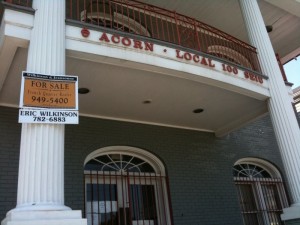From Steve Beatty, Pelican Institute’s investigative reporter:
More than two years before an ersatz pimp and prostitute raised troubling questions about Acorn Housing Corp.’s financial advice, Louisiana officials criticized the organization’s bookkeeping as it denied the group tens of thousands of dollars from a potential $1.5 million state contract.
The office overseeing the contract recommended against rehiring Acorn Housing in part because it couldn’t document its work. The contract was designed to inform low-income residents about the Road Home program and help them apply for post-hurricane benefits.

A much smaller $53,000 contract that Acorn Community Land Association had with the state attorney general’s office also was criticized for thin financial justification, though the group got its full payment and was recommended for future work. The contract was to tell hurricane victims of non-discriminatory housing policies as they sought temporary rentals.
In both contracts, the state files contain promotional materials extolling the virtues of paying for an ACORN membership – a solicitation expressly forbidden under the contracts.
“If you are not rich, you need to join your ACORN community group and work on the problems affecting you,” reads one flier in the attorney general’s file.
Several governors, including Louisiana’s Bobby Jindal, have frozen payments to ACORN or its hundreds of affiliated groups. The state has no current contracts, but records revealed the two expired contracts that paid the organizations more than $700,000.
ACORN officials did not respond to requests for comment for this story.
In the larger of the two state contracts, Acorn Housing was paid $671,000. However, it asked for much more: $801,000.
In the final evaluation of the contract, the state said Acorn Housing achieved the goal of reaching some of the targeted potential Road Home applicants, but it recommended that the state not rehire Acorn Housing.
That’s mainly because Acorn Housing kept lousy records, said Belinda Kennedy, who monitored the contract for the state’s Office of Community Development.
In the end, she rated Acorn Housing as being in “marginal compliance” with the state contract.
“There were items they were billing that we couldn’t account for,” she said in an interview this week.
Overall, the state said the invoices on file in the Acorn Housing office didn’t always match what was submitted to the state, some travel expenses couldn’t be confirmed or justified, and that the hours worked by employees weren’t always properly billed.
The final review of the contract said that Acorn Housing worked face-to-face with 629 households and another 159 over the phone in the 10 months between December 2006 and September 2007. Its subcontractor, working in rural western Louisiana parishes more affected by Hurricane Rita, reached more people, for a total of 2,099 households served by the contract.
Kennedy worked with Acorn Housing officials to try to clear up the bookkeeping problems, visiting the New Orleans office four months after the contract ended. She said she encouraged agency officials to work to justify some of the questionable billing.
“We never heard back from them,” Kennedy said.
More background on this story can be found here.
COMMENTS
Please let us know if you're having issues with commenting.